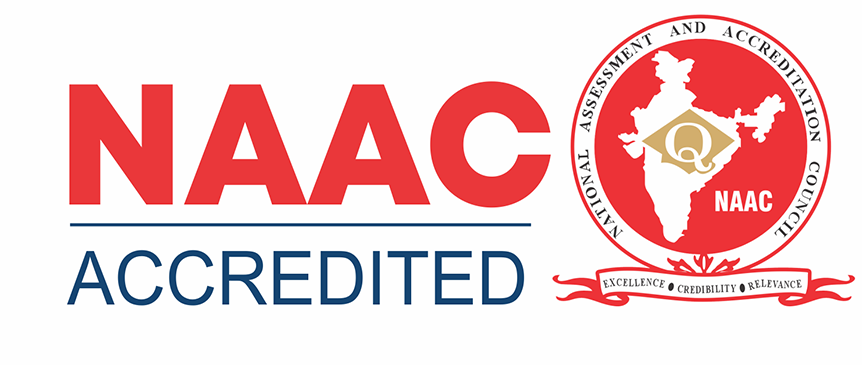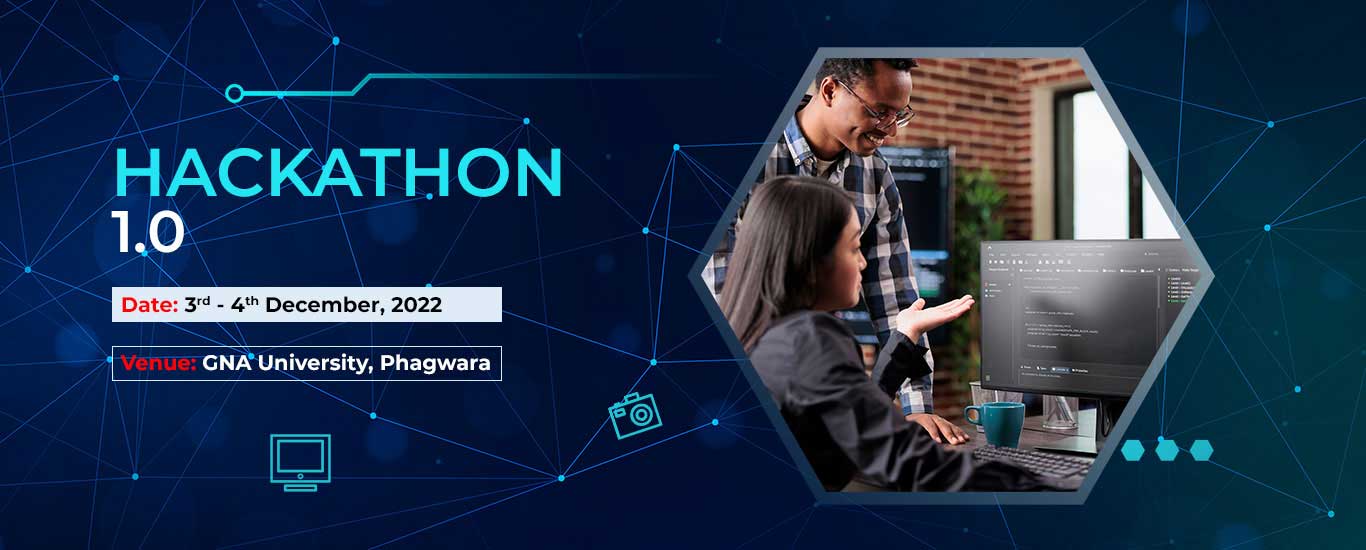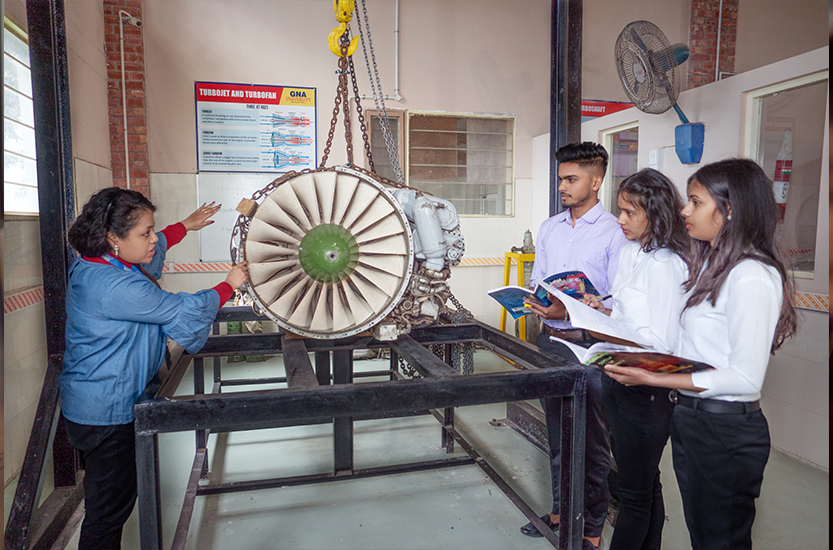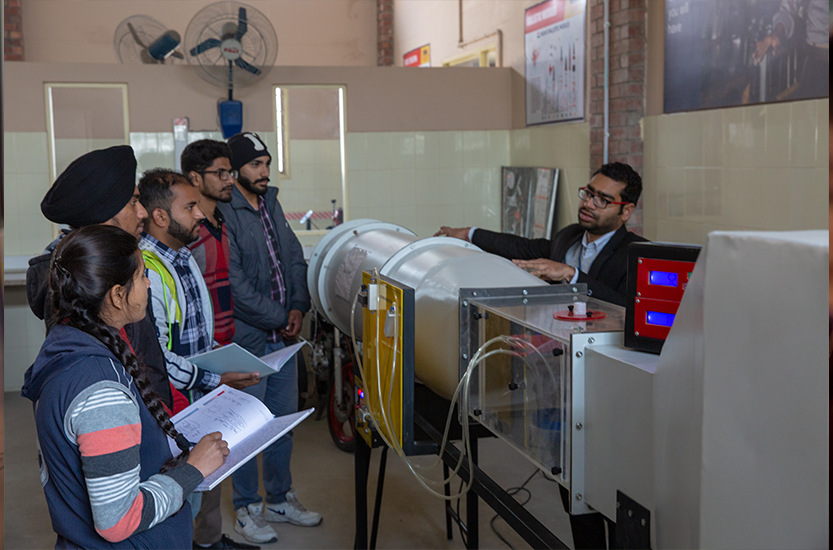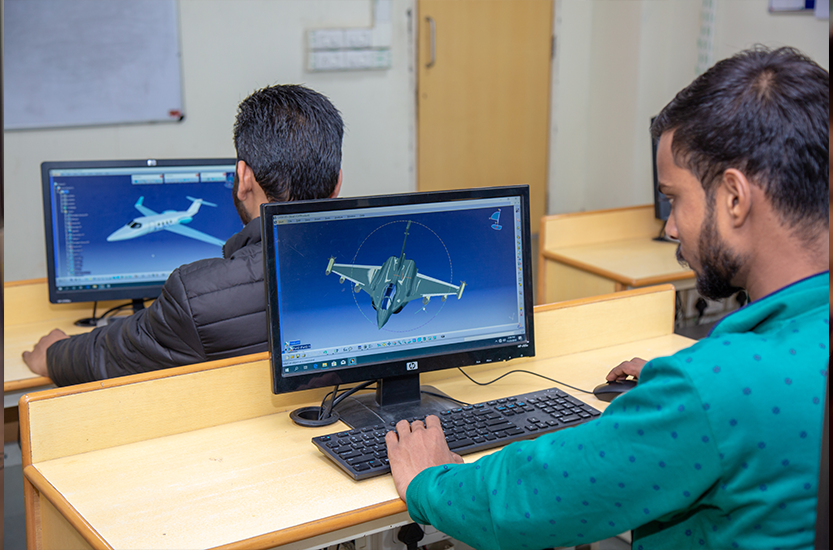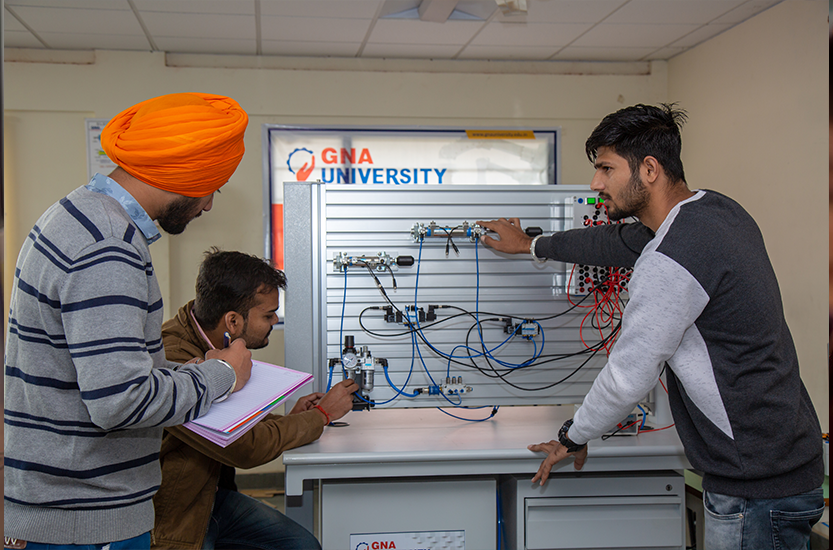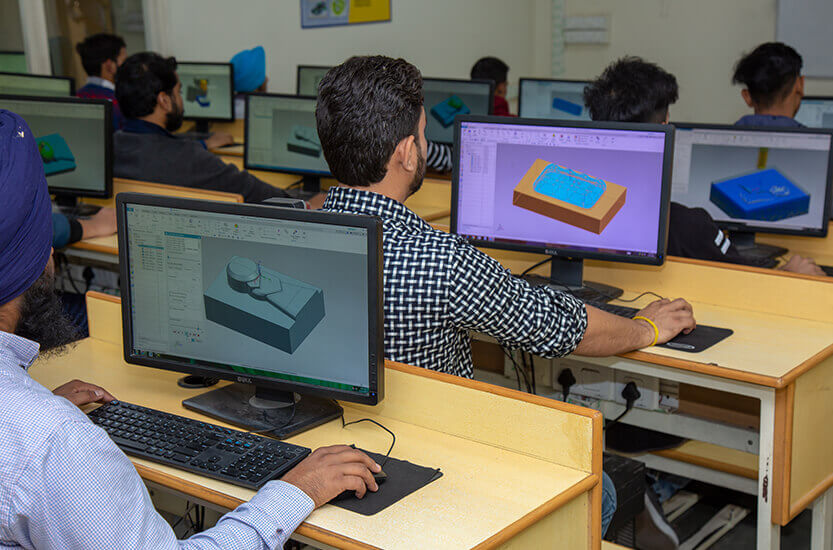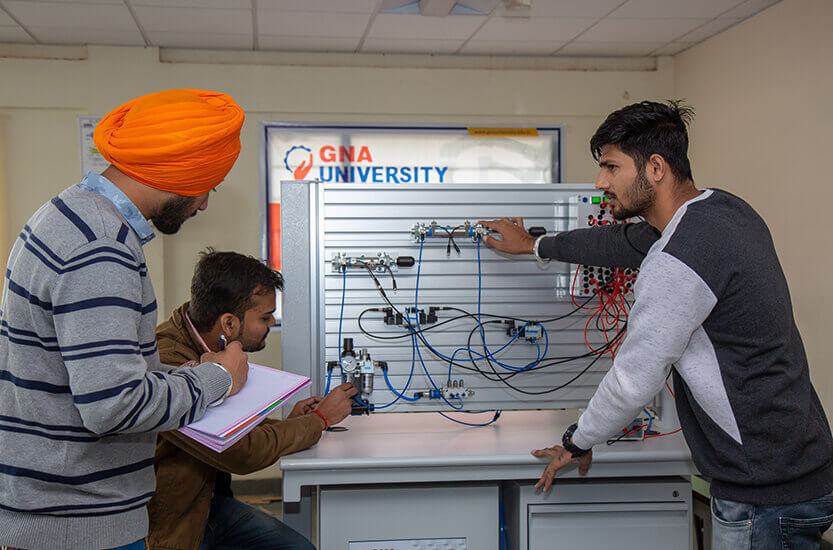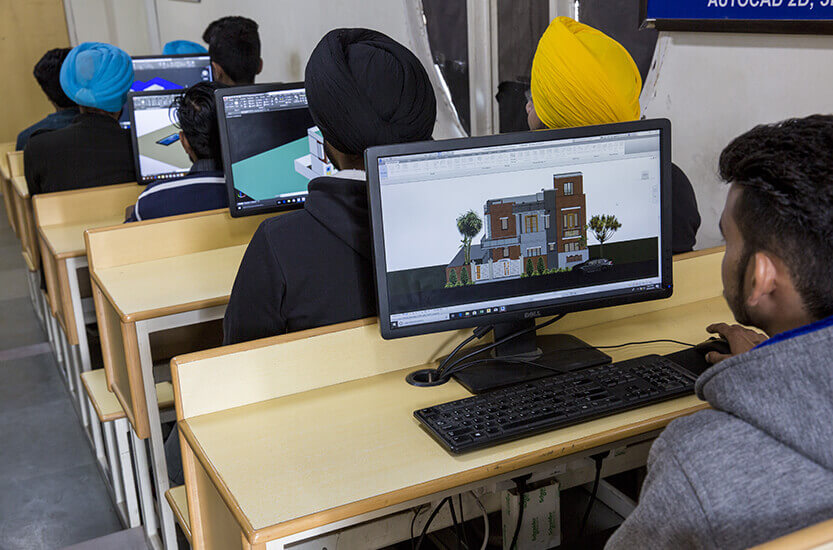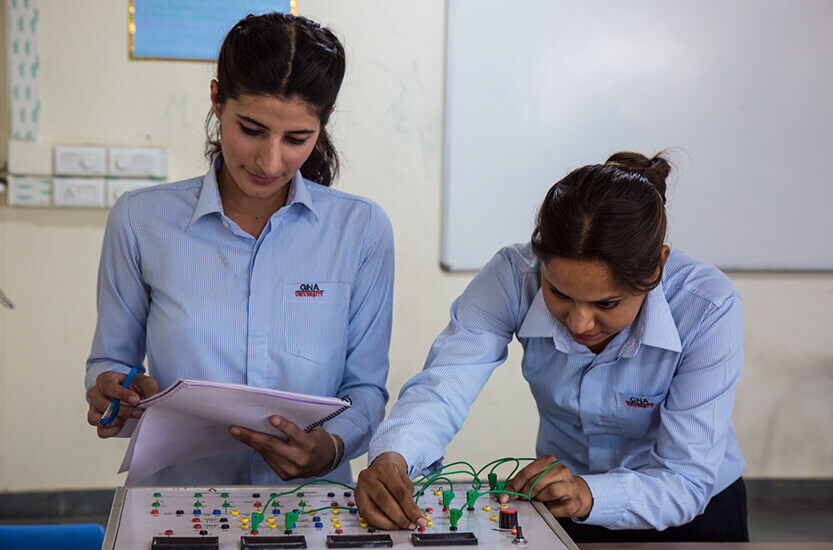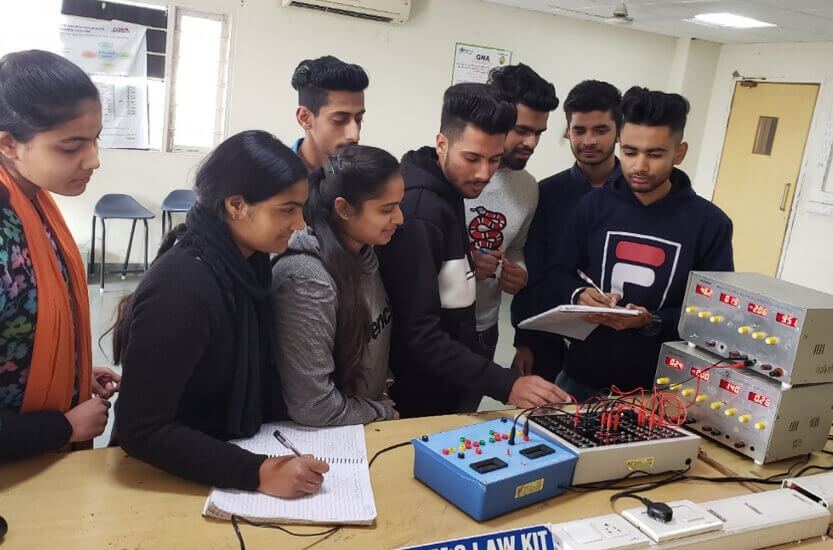CSE is an enthralling and unique innovative subject that encourages students to pursue creativity and technology.
Computer Science Engineering has roots in electrical engineering, mathematics, and linguistics.
Computer Engineers who work as systems analyst do research about the existing problems and plan solutions for the problem.
About Computer Science and Engineering (CSE)
The department offers B. Tech (Computer Science and Engineering) as major degree along with an option of minor degree in Artificial Intelligence & Data Science or Cyber Security or Cloud Computing or Full Stack Development.
Computer Science and Engineering (CSE) is one of the fastest growing segments of the industry today, it is also one of the fastest changing areas technologically. Every small scale to big scale IT company needs a Computer Engineer as the world is moving towards Digital World. It provides ample number of opportunities for the students to grasp enriched knowledge through curriculum driven by IT companies.
The major focus of this program is to nourish student’s skills on skill-based learning with heterogeneous requirements. The study of computer science involves systematic study of algorithms to acquire, represent, process, store, communicate and access information from a wide variety of sources.
...
CSE with other programs -
Program Outcomes:
Program Specific Outcomes:
Download B.tech Computer Science & Engineering Brochure
PROGRAM HIGHLIGHTS
B. Tech (CSE) program is designed for the students who wish to start their career in the IT companies as Full Stack Developer, Software Developer, Mobile App Developer, Website Developer, UI/UX Developer, Database Experts, Cyber Security Expert, Network Experts, AI Engineer, Cloud Engineer, Data Engineer etc., acquiring an ability to develop diverse solutions, design novel products and solve complex problems.
Moreover, the students will be able to:
- Understand the principles and working of computer systems by assessing the hardware and software aspects of computer systems.
- Understand the structure and development methodologies of software systems. They will possess professional skills and knowledge of software design process, familiarity and practical competence with a broad range of programming language and open source platforms.
- Apply mathematical methodologies to solve computation task, model real world problems using appropriate data structure and suitable algorithm.
- Gain the ability to use knowledge in various domains to identify research gaps and hence provide solution to new ideas and innovations.
Key Highlights of the department:
- The Department of Computer Science and Engineering, SEDA-E has skilled and experienced faculty.
- The curriculum of the department is as per recent industrial needs.
- The department has state-of-the-art infrastructure including high tech labs, latest books etc.
- The department also provides opportunities for global certification with AWS, Palo-Alto, Oracle, Red Hat etc. in the field of AI, Cyber Security, Cloud Computing and Full Stack Development.
- The alumni of the department are placed in top notch Multi-National Companies.
- The department provides placement preparation classes and assist for placements
List of Major & Minor(s) Degree Offered for 2023 B. Tech CSE batch Onwards
Major Degree: Computer Science and Engineering
Optional Minor(s) Degree:
- Artificial Intelligence & Data Science
- Cyber Security
- Cloud Computing
- Full Stack Development
Head of the Department
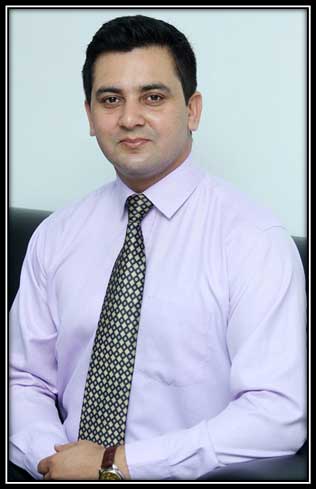
Dr. Anurag Sharma is doctorate from Dr B. R. Ambedkar National Institute of Technology, Jalandhar in the field of Engineering (Artificial Intelligence). He is M.Tech and B.Tech from Punjab Technical University, Jalandhar. He has more than 18 years of total experience in Teaching as well as in Industry.
He worked with various industries like Bharat Electronics Limited, Punjab Communication Limited, Elcom Systems and in various educational institutions.
He is recipient of ISTE best teacher’s award four times and is Wipro Mission 10x certified faculty member. He has guided more than 4 PhD Scholars, 25 M.Tech students dissertation and is guiding 08 PhD scholars.
He has published more than 100 research articles in reputed international journals/conferences. He has received grants from Indian Council of Medical Research (ICMR), Department of Science and Technology (DST) and JiM Grant from UK for his research works.
Industry Collaborations
SEMESTER WISE SUBJECTS
There will be an in-house summer internship of 4 weeks after the completion of 2nd Semester.
There will be summer internship of 6-8 weeks after the completion of 4th Semester.
There will be summer internship of 6-8 weeks after the completion of 6th Semester.

Vision
“To produce competent technocrats, researchers and entrepreneurs in the area of Computer Science and Engineering with technical skills and ethical values to be accepted globally, meeting societal expectations and to generate employability.”
Mission
- To establish an environment that is conducive for learning and inculcation of professional ethics.
- To provide real time exposure to latest hardware and software technologies in Computer Science for meeting the growing needs of industry.
- To impart ethical, technical and holistic skills through a well-designed curriculum.
- To promote entrepreneurship and R & D activities by encouraging the students to participate in national/international events.
- To enhance industry-institute interaction for mutual benefits.
Program Educational Objectives (PEOs)
- Graduates will be able to apply their technical skills in design and implementation of systems particularly in software and hardware components.
- Graduates will be able to adapt, contribute, and innovate in the key domains of Computer Science and Engineering and relevant branches of engineering.
- Graduates will be able to obtain employment in organizations or be entrepreneurs by establishing themselves as professionals and applying professional ethics and technical skills to solve real-life problems and meet the diversified needs of the industry, academia, and research sectors.
ELIGIBILITY REQUIREMENTS
10+2 (Non-Medical) with 55% equivalent with (45 % for SC/ST/OBC) marks in aggregate from any recognized board
- (Admission in first year)
or
(Admission in 2nd Year Lateral Entry) - AICTE has prescribed the following eligibility criteria for admission in B. Tech/B. E Program in Engineering & Technology through Lateral entry to 2nd year.
- Passed Minimum 3-years/2-years (Lateral Entry) Diploma examination with at least 55% marks (45% marks in case of candidates belonging to reserved category SC/ST) in any branch of Engineering and Technology.
COURSE DURATION
4 years of skill based experience at GNA University’s campus
B. TECH. CSE WITH MINOR ENGINEERING
Keeping in view the interests of the student, we at GNA University, offer the student to choose multiple domains in engineering. Students may opt for a secondary field of engineering as Minor Engineering from 3rd semester, along with their primary chosen field. In order to have an additional Minor Engineering, a student must earn additional minimum 20 credits in the chosen field of minor engineering.
B.TECH. HONORS
A student will be eligible to get Engineering degree with Honors, if he/she completes an additional 20 credits. These could be acquired through MOOCs/NPTEL courses subject to approval by the Dean/Head of the School of Engineering Design and Automation.
CAREER OPPORTUNITIES
Students after getting the B.Tech in CSE can be placed in different areas like IT Industries/MNCs, academia, research, government, private or nonprofit organizations or can become Entrepreneur. Students of CSE get exposure to various challenges, problem formulation, test solutions, various advance multimedia equipment and also, they work as a team to develop various software.
New ideas are developed every day. Success will require an ongoing commitment to maintaining up-to-date knowledge as well as a dedication to push beyond the comfortable, to explore, innovate, and create.
Career Pathways:
- Full Stack Developer
- Software Engineer/Developer
- Database Administrator
- Web Developer
- Software Tester
- IT Architect
- Network Administrator
- System Analyst
- Hardware Engineer
- AI/ML Engineer
- DATA Engineer
- Data Scientist
- Cloud Engineer
- Cyber Security Expert
STUDENT TESTIMONIALS
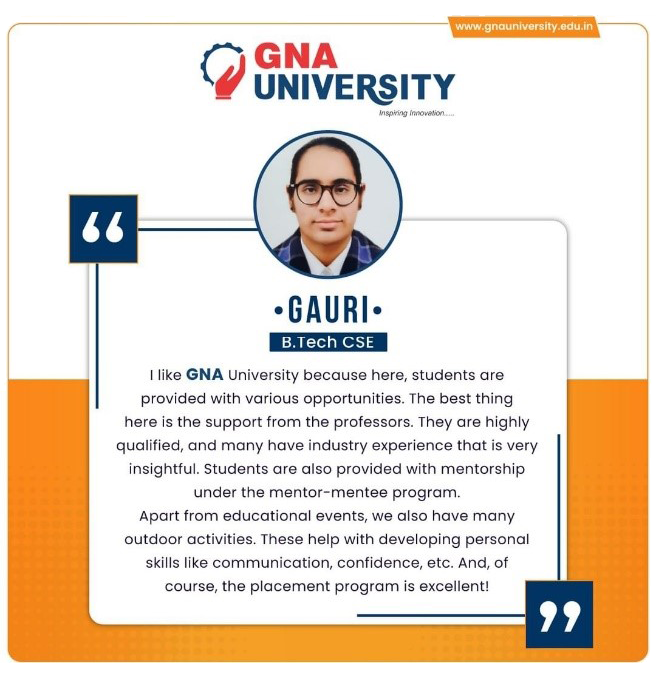
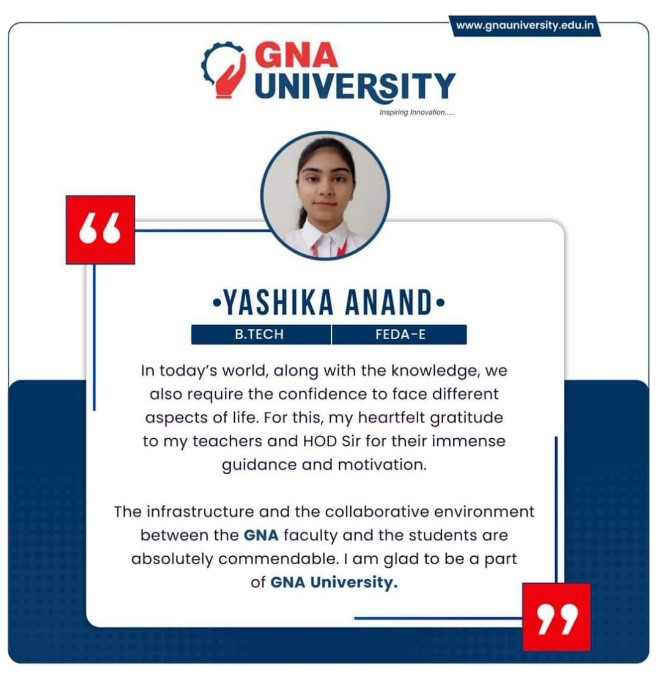
PLACEMENTS
Students of GNA University after completion of B. Tech. Computer Science & Engineering with Data Analytics are placed at various reputed IT firms:
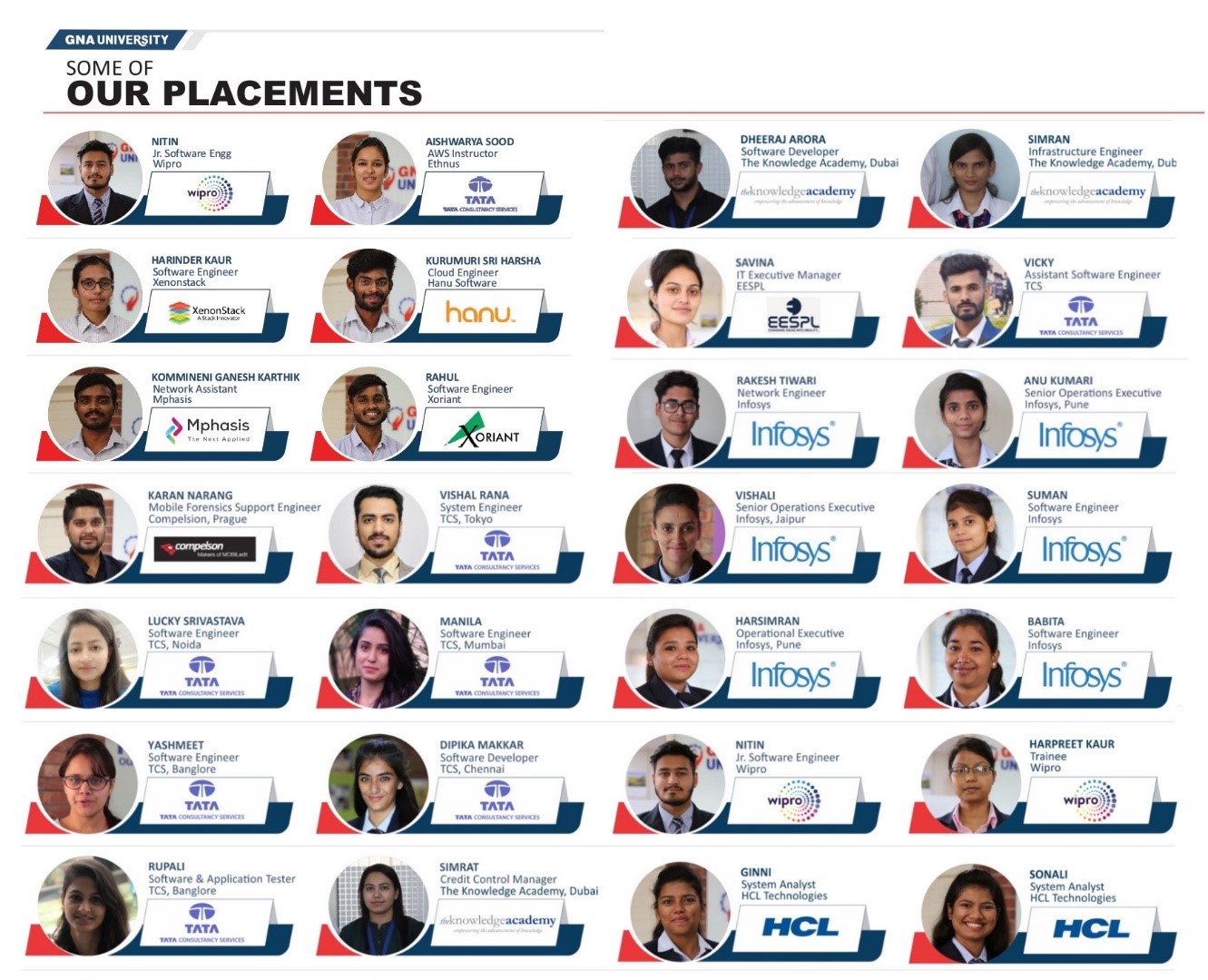
Teaching Pedagogy and Learning Methods
- Analogy Based learning
- Expert Lectures from Industry Experts
- Industrial Visits
- Project Based learning
- Role Plays for learning
Some Glimpses:
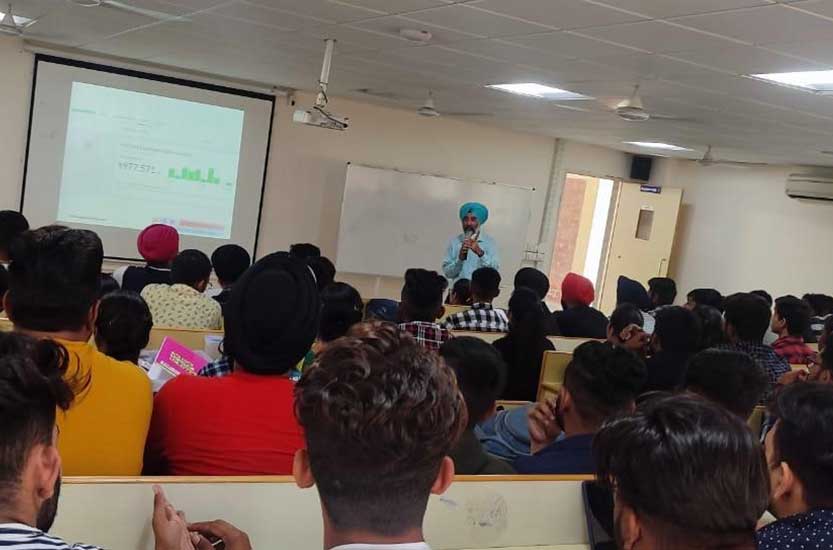
Expert Lecture
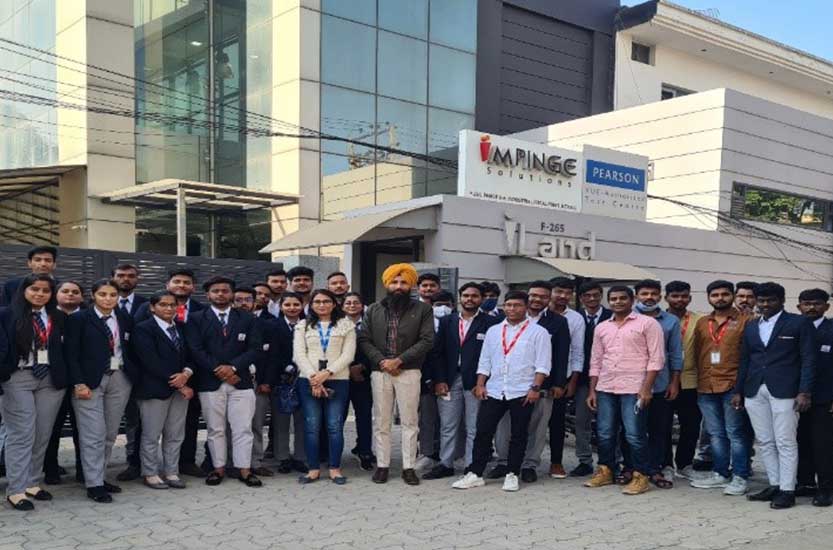
Industrial Visit

Project Demonstration
Faculty Wise Research Publications
| Sr. No. | Name of Faculty | Research /Publications |
|---|---|---|
| 1 | Dr. Anurag Sharma |
International/National Journals
International/National Conferences
Books and Book Chapter Published
|
| 2 | Ms. Rajvir Kaur |
International/National Conferences Protein Structural Prediction based on hybridization of PSOFFA and CNN-BILSTIM (ICCCIS-2022). |
|---|---|---|
| 3 | Ms. Reena Agnihotri |
International/National Journals
|
| 4 | Dr. Sumit Chopra Mr.Gagndeep Singh Ms. Simranjot Kaur |
International/National Journals
International/National Conferences
|
| 5 | Ms. Shaina |
International/National Journals
International/National Conferences
|
| 6 | Dr.Anil Pandit |
International/National Journals
|
| 7 | Mr.Amit Walia Mr.Inderjit Singh |
International/National Journals
|
| 8 | Dr.Hitesh Marwaha |
International/National Journals
|
| 9 | Mr.Narinder Kumar |
International/National Conferences
|
Feedback for Curriculum
- Alumni Feedback https://forms.gle/PnT3TYwLfayUfbav6
- Faculty Feedback https://forms.gle/bju8NU7ysyeDZ2uP9
- Industry Expert Feedback https://forms.gle/cwjcCApP4vX3aXedA


